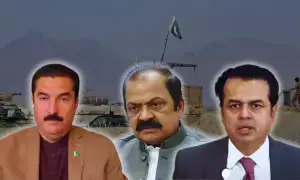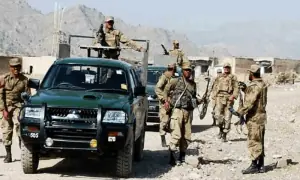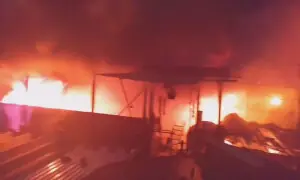Kakar says Mohammed bin Salman’s Pakistan trip won’t be brief
6 min readSaudi Arabia Crown Prince Mohammed bin Salman will be in Pakistan for a longer duration, interim Prime Minister Anwaarul Haq Kakar has said, as the South Asian country seeks big investments from the oil-rich Gulf country.
“Both sides [Pakistan and Saudi Arabia] have an understanding that he [Mohammed bin Salman] will be here for a longer duration and which will be easier for both sides and acceptable,” Kakar said in an interview with Aaj News programme Spot Light with Munizae Jagangir that was aired on Monday.
Pakistan is all set to host the Saudi crown prince, but the date is not confirmed yet. According to the interim government, the kingdom has shown interest in Pakistan after the formation of the Special Investment Facilitation Council – a civil-hybrid forum. The country has pitched many areas to the Gulf country for investment.
Mohammed bin Salman, who is often referred to by his initials MBS, visited India to attend the G20 summit. He also met with Indian PM Narendra Modi on the sidelines of the meeting.
The Saudi crown prince’s visit to Pakistan was one of the many points discussed during Kakar’s interview. He said that both sides were excited and quite sanguine about it and deliberations were being held on different projects, including mines, minerals, agriculture, and refineries.
“Our understanding is that he might come here for a long duration. He won’t be here for a brief visit,” he said and when the interviewer asked if it would be for two days he replied it would be too early to say that.
“We are trying that ready-to-go projects are done from our side and when he is here we can conduct a signing ceremony then,” said Kakar.
Army chief’s role in crackdown on illegal money exchangers
When asked about rising inflation and the recent crackdown on illegal money exchangers, the caretaker prime minister said that inflation was linked to the availability of products, demand, and supply of items.
He went on to add that such an issue was related to governance that was not addressed in the past due to a lack of coordination among the federal government, provinces, and local government.
The inflation rate was affected as soon as it started improving, he added.
“Army chief has a big role which is government owned and supported,” he said in reply to a query about his part in such efforts. Chief of Army Staff General Asim Munir had meetings with businessmen before the crackdown on dollar smugglers and hoarders of food items.
He dismissed the merit of criticism on the involvement of the COAS in anti-smuggling efforts and improving the economy as it was not a contest of who was more effective. Kakar supported his argument by saying that the whole of a government approach was important help of an institution whose office was strong was taken.
“Who was my implementing arm as a caretaker prime minister? EAD, Finance Department, EAD? How much tax I collect per year that people criticise me that I should perform better. If my FBR, all these critics, if they collected Rs30,000 billion of tax collection then maybe my perception from that other head of organisation would have been much better. When you have such an implementing arm who are poor performers, non-performers, and ill performers so in that you have an available organisation in the form of the military, you have to take from help them rather than having a contest or confrontation with them. Work together for a larger agenda.”
Army’s defence budget
According to the caretaker prime minister, there were different perceptions among the people about the defence budget of the army.
“Seventeen per cent of our defence budget is overall part of budget, which includes military, navy, and air force. $8 billion to $10 billion is our annual defence budget. When I compare it with the region, India has $180 billion to 190 billion. I think my security service is very cheap [not in the qualitative sense but in the quantitative sense]. I think it should be raitonalise and it should increase.”
Cross-border attack from Afghanistan
He was also asked about the recent incursion of terrorists in the Chitral district of Khyber Pakhtunkhwa from Afghanistan.
Kakar replied that their intention and capability were being gauged.
“If there is any Westphalian idea of the state in Afghanistan that a central state authority is there and its command structure goes to the border post, it is not like that,” he said and explained that there were multiple layers of government structure.
He highlighted the bond shared by the banned TTP with its ideological twin Afghan Taliban—the interim rulers of Afghanistan.
When asked about Pakistan’s response as suggested by caretaker Interior Minister Sarfraz Bugti on Sunday, Kakar said: “Pakistan’s prime responsibility lies to defend its own borders and we will do that at any cost.”
When pressed, he said: “Whatever the cost is.” He added that the inclusion or exclusion of any strike in Afghanistan was not under consideration. “We think our digital space, airspace, physical space is sacrosanct. And, its sanctity would be ensured by our border management and air force.”
He highlighted that Pakistan has different mechanisms for sharing information with Afghanistan.
“We have many things you want people to not unnerve because of truth.”
He wondered whether Afghanistan had a central authority after global power spent around $3 trillion in the country after the intervention of the Western Hemisphere.
Kakar said the central authority project did not succeed in the neighbouring country because the rest of the world went home.
“The remaining control is a defacto government is not a de jure government. It is not a legitimate government,” he stated and described the situation as a complex web on which the government was working by having focus.
Govt will go for review if SC strikes down NAB amendments
Kakar shared that there were probabilities that the government would go for a review if the Supreme Court strikes down the National Accountability Bureau amendments
He clarified that the inherent right to legislate lies with Parliament that’s why the government should defend it.
ISI chief
“I think this specialised information is about a specialized area. It has not a big role in the public domain,” he said in response to a query on the incumbent spy chief tenure which is going to end soon.
“Its connotation is linked with security. Desecration of the PM will be applied prudently and wisely and the information to divulge about the decision will be shared according to our own timings,” he added.
Kakar stated that the government had maximum manoeuvring space and the military input was coming. The final decision would be taken by the cabinet.
In the interview, he highlighted that the crackdown on Afghan refugees would only apply to those who are living in Pakistan illegally.
While answering a query about the arrest of Ali Wazir, he presented two views. Firstly he mentioned that political dialogue and discourse were inherent rights of the people. But Kakar added that chaotic generation attempts should be discouraged
He was of the view that Parliament was a forum to change pertaining laws to sedition.
Kakar added that he would have an inquiry against those who vandalized the place of worship belonging to Ahmadis.
“Taking the law into the hand is neither an answer nor we allow it.”
For the latest news, follow us on Twitter @Aaj_Urdu. We are also on Facebook, Instagram and YouTube.





















Comments are closed on this story.